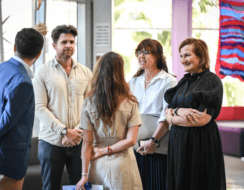28 Jul 2020
NewsFrom the CEO: We are witnesses to history
In the middle of our country’s health and economic crisis, it is tempting to let this news pass unnoticed. Between the bushfires, COVID-19 pandemic and subsequent recession, 2020 has been a year for the history books and wreaked a devastating toll on our communities.
But most of us alive today have also been witness to another part of Australian history – one that I am certain will be viewed alongside the frontier massacres and the Stolen Generation as a dark blight on our shared heritage.
Offshore processing was first introduced under a Labor government in 2013, and it has continued under our present leadership as a deterrent to people seeking asylum in Australia by boat.
According to Human Rights Watch, more than 3,000 people have been interred on the camps on Manus Island and Nauru, and today, around 370 still remain there in limbo. Some 700 were resettled in the United States, while another 1,200 were transferred to Australia for medical treatment. More than 200 of these people are still detained in detention centres and hotels.
Those who have been fortunate enough to move to the community have experienced intense hardship – and this has only worsened with the recent pandemic. A survey SSI conducted in May showed that temporary visa holders like these people seeking asylum are going without food and medicine as a result of COVID-19.
Still, there is a glimmer of positivity in Friday’s news that Behrouz Boochani has been offered a permanent safe haven in New Zealand. As I’ve previously written, Behrouz obtained a temporary visa to visit New Zealand for a literary event last year. Being officially recognised as a refugee means he now has a permanent future away from Manus Island.
“I am very happy to have some certainty about my future, I feel relieved and secure finally,” he told The Guardian.
In Australia, we have also seen our state governments step up with funding and support for temporary visa holders, including people seeking asylum, international students and working-holiday makers.
You don’t have to be a government decision maker to help people seeking asylum during this pandemic. For example, SSI has opened up a referral and support clinic in Parramatta that is open to all people in need – regardless of visa status. This has created support for people seeking asylum who are ineligible for many government-funded programs and welfare. We’ve also begun offering tailored support for entrepreneurs from refugee and asylum seeking backgrounds to assist them to navigate this pandemic and implications for small business.
They are small steps in what we hope is a larger shift in the way our country perceives and treats people based on their visa type. This pandemic has shown that we are only as strong as our most vulnerable community member.
Violet Roumeliotis
SSI CEO


